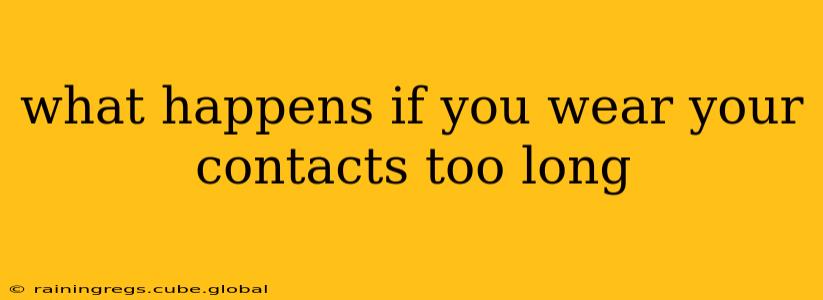Wearing contact lenses for longer than recommended can lead to a range of serious eye problems. Ignoring the prescribed wear schedule, whether it's daily disposables, extended wear, or traditional replacement schedules, significantly increases your risk of infection and other complications. This article will delve into the potential consequences of prolonged contact lens wear, addressing common concerns and helping you understand the importance of proper lens hygiene and adherence to your eye doctor's instructions.
What are the risks of wearing contacts for too long?
Prolonged contact lens wear deprives your eyes of the oxygen they need. This oxygen deprivation creates a breeding ground for bacteria and other microorganisms, significantly increasing your risk of infection. Common infections include:
- Corneal ulcers: These are open sores on the cornea, the clear front part of your eye. They can be incredibly painful and can lead to permanent vision impairment if left untreated.
- Keratitis: This is an inflammation of the cornea, often caused by bacterial or fungal infections. Symptoms include pain, redness, blurred vision, and light sensitivity.
- Giant papillary conjunctivitis (GPC): This is an allergic reaction to contact lenses, causing inflammation of the conjunctiva (the membrane lining the eyelid and covering the white part of the eye). It leads to itchy, watery eyes and can cause significant discomfort.
What are the symptoms of contact lens-related problems?
Recognizing the symptoms of problems arising from wearing contacts for too long is crucial for timely treatment. If you experience any of the following, remove your contacts immediately and contact your eye doctor:
- Redness and irritation: Persistent redness or irritation that doesn't subside after removing your contacts.
- Blurred vision: A sudden or significant change in your vision.
- Eye pain or discomfort: Any pain, burning, or itching in your eyes.
- Increased sensitivity to light: Light seems brighter or more bothersome than usual.
- Excessive tearing or discharge: More tears than normal, or a cloudy or yellowish discharge.
- Feeling something in your eye: A persistent feeling of a foreign body in your eye.
How long is too long to wear contacts?
The "too long" timeframe depends entirely on the type of contact lenses you wear and your eye doctor's specific recommendations. Always follow your eye doctor's instructions. This information is vital, regardless of whether you use daily disposables, monthly disposables, or extended-wear lenses. Daily disposables, while convenient, can still cause issues if worn overnight or beyond the intended single-day use. Ignoring prescribed replacement schedules for other types of contacts significantly elevates the risk of complications.
Can wearing contacts overnight damage your eyes?
Wearing contacts overnight is generally not recommended unless explicitly prescribed by your eye doctor for specific extended-wear lenses. Even with extended-wear lenses, overnight wear increases the risk of infection and other complications. The prolonged lack of oxygen to the cornea significantly increases the susceptibility to microbial growth.
What should I do if I think I've worn my contacts too long?
If you suspect you've worn your contacts for too long, immediately remove them and thoroughly wash your hands. Observe your eyes for any symptoms mentioned above. If you experience any discomfort or concerning symptoms, contact your eye doctor immediately. Prompt treatment is essential to minimize potential damage to your eyes.
How can I prevent problems from wearing contacts too long?
The best way to prevent problems is to meticulously follow your eye doctor's instructions regarding wearing time and contact lens care. This includes:
- Following the replacement schedule: Replace your contact lenses according to your eye doctor's recommendations.
- Proper hygiene: Always wash and dry your hands thoroughly before handling your contact lenses. Properly clean and disinfect your lenses as directed.
- Regular eye exams: Schedule regular eye exams to monitor your eye health and ensure your contact lenses are still appropriate for your needs.
- Immediate removal at the first sign of discomfort: Don't hesitate to remove your lenses if you experience any irritation or discomfort.
By adhering to these guidelines, you can significantly reduce your risk of developing serious eye complications from wearing your contact lenses. Remember, your eye health is paramount – don't compromise it by neglecting your eye doctor's recommendations.
